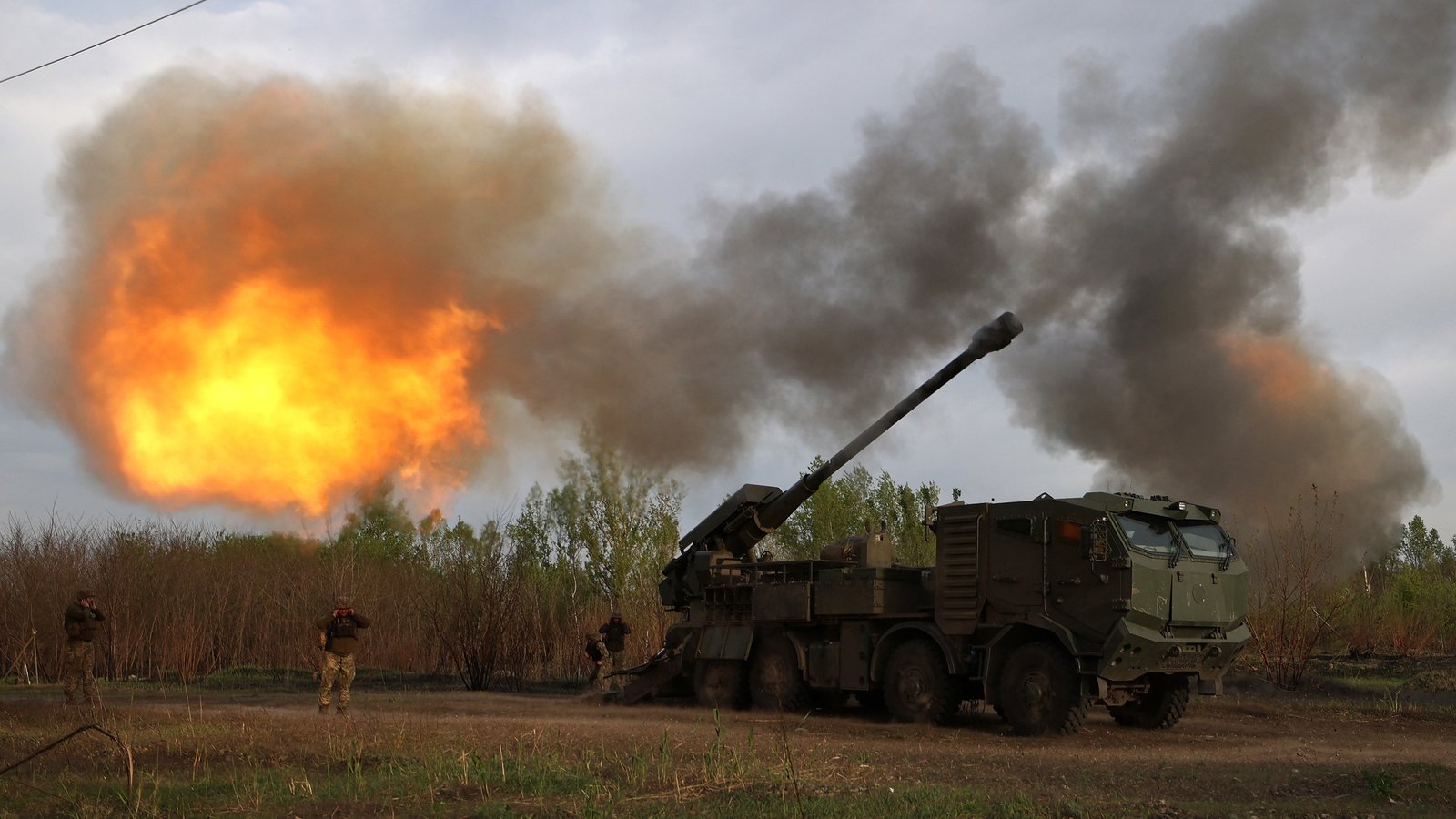the Europe campaign in Hungary
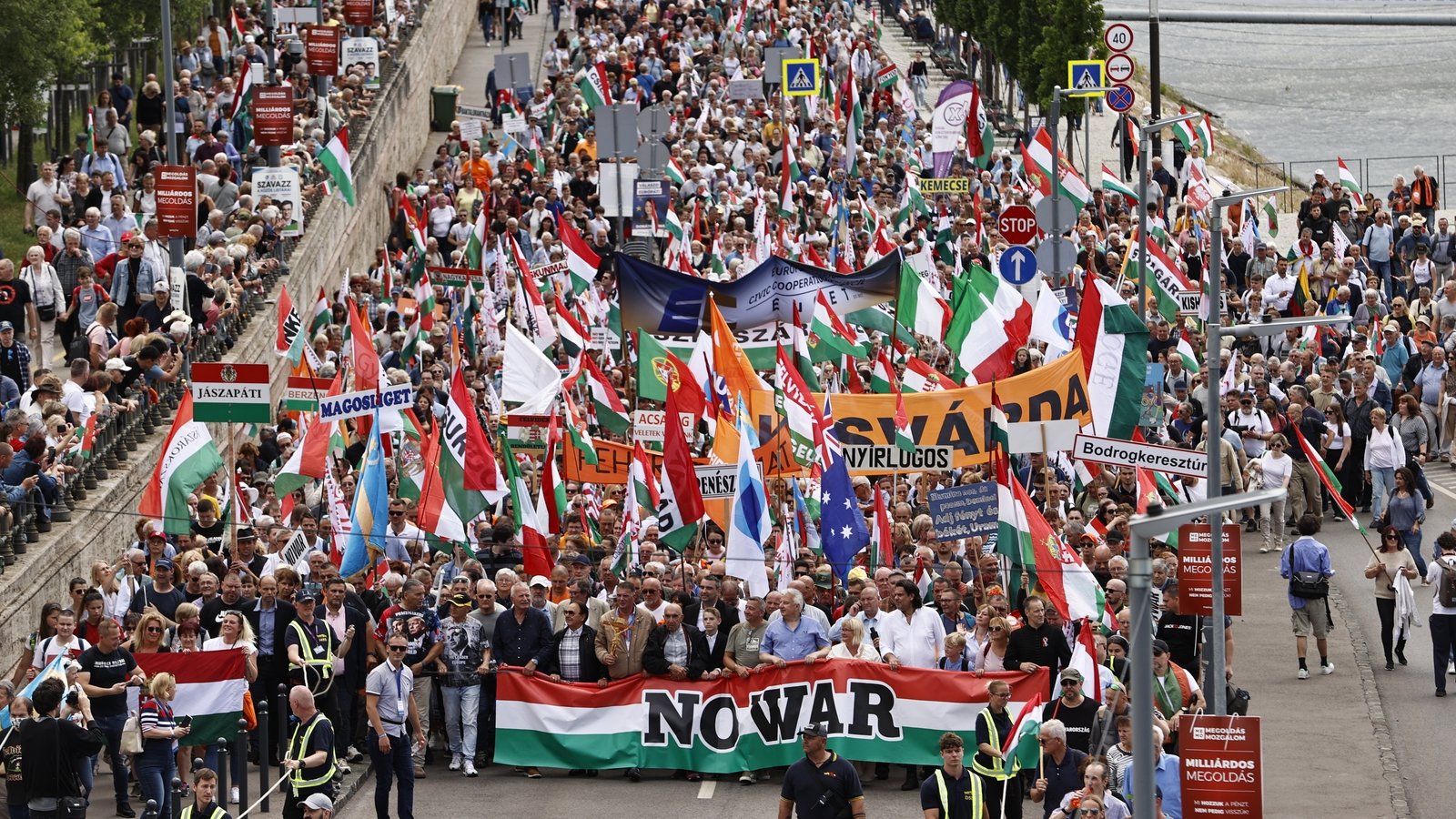
Travelling across Budapest, it is hard not to notice the ‘Stop War’ posters. Granted, they are printed in Hungarian and my fixer had to translate that “háboru” is Hungarian for “war”.
The posters feature on billboards outside metro stations, on street corners and at bus stops.
The “Stop War” campaign also features heavily as a 15-second YouTube advert in Hungary and has been played more than 10 million times since launching on 14 May.
Look more closer and behind the lettering, the images of Hungary’s three best-known opposition leaders, as well as Hungarian-American entrepreneur and philanthropist George Soros are featured.
Mr Orbán has long criticised 93-year-old Mr Soros for his funding of Hungarian civil society groups and liberal universities.
But these are not posters by a pro-peace charity group.
They are election campaign posters for Hungary’s ruling Fidesz party ahead of next Sunday’s European and local elections, which are being held on the same day. The call to action at the bottom of the posters reads: “June 9th. Only Fidesz”.
Another Fidesz poster that emerged last week across the country displays the word “peace” (“béke” in Hungarian) over an image of Prime Minister Viktor Orbán.
The main message from Fidesz in this election campaign is that a vote for the ruling party is a vote for peace.
At his party’s final big campaign rally in Budapest on Saturday, named the ‘Peace March’, Mr Orbán told tens of thousands of party supporters that “Europe was preparing for war”.
His mission, he said, was to keep Hungary out of the war “as an island of peace”.
Behind Mr Orbán, a large ‘No War’ banner in the Hungarian national colours and printed in English, adorned the ground.
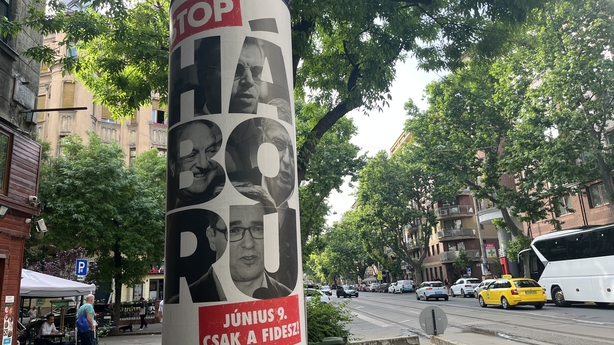
“The government has this claim that the war is going on essentially because these Western and liberal forces are pushing for the war to continue,” Gábor Győri, a senior policy analyst at a progressive think tank in Budapest told RTÉ News.
“Viktor Orbán’s argument is essentially there should be a ceasefire. What the message really translates into, in practice, seems to mean that Ukraine should surrender,” said Mr Győri.
Hungary’s political landscape is deeply polarised between a populist Fidesz-led government, which has been in government since 2010, and a fragmented opposition of mostly left and liberal parties.
Negative campaigns, directed at political opponents rather than against political parties, are common practice, particularly by the ruling party.
Another poster campaign across the capital reads “Humble servants of Brussels” and features opposition leaders alongside European Commission President Ursula von der Leyen, photoshopped into a red leather chair in the centre of the image.
It is unclear which party or organisation is behind the “humble servant” poster but it carries the government’s campaign message of “No migration, no gender, no war”, a catchphrase that Mr Orbán delivered in April when he summed up Fidesz’s manifesto for the European elections.
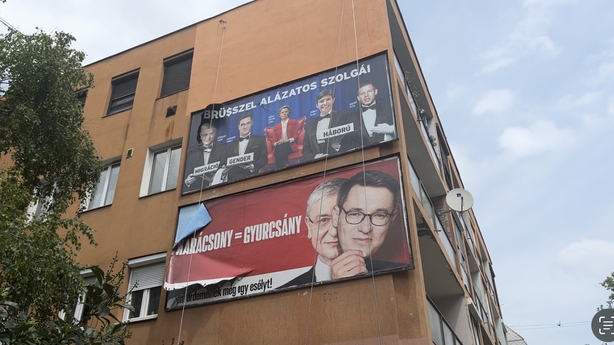
features opposition politicians as well as Ursula von der Leyen
For the past decade, Fidesz has opposed EU migration quotas and, what the party terms as, “gender propaganda”. It is a strategy that has proved popular with its socially conservative support base and helped it to win four successive parliamentary elections.
Since Russia’s full-scale invasion of Ukraine in February 2022, Budapest has maintained close political and economic ties with Moscow, while it continues frosty relations with Kyiv, largely stemming from a long-running dispute over the language rights of the Hungarian minority in western Ukraine.
Last October, Mr Orbán met with Russian President Vladimir Putin at an economic conference in Beijing, much to the disbelief of senior EU officials and leaders.
His foreign minister Péter Szijjártó has visited Russia on more than five occasions since the invasion to discuss energy deals with Kremlin officials.
The Hungarian government has always insisted that it supports sending humanitarian aid to Ukraine, and has done so since the start of the invasion. It also condemned Russia’s invasion in February 2022.
However, Budapest’s continued closeness to the Kremlin is wearing thin with other EU member states.
Last week, Hungary’s decision to block yet another EU military aid package for Ukraine was criticised by Lithuania’s foreign minister Gabrielius Landsbergis. He said Hungary had blocked 41% of EU resolutions dealing with Ukraine since the war started.
Despite the Fidesz party’s focus on the war in this election campaign, a survey in February by the European Parliament found that public healthcare, job creation and the future of Europe were the three most important issues for Hungarian voters in the European elections.
On Thursday evening, candidates from 11 political parties debated issues for the European elections – the first time since 2006 that the public broadcaster has broadcast such a debate.
Opposition speakers criticised the narrow choice of topics which included national security, migration and a choice between either agriculture or the rule-of-law.
But the government’s policy of not sending military aid to Ukraine is backed by a majority of Hungarians.
A Eurobarometer survey published last week found that while 56% of Hungarians support providing financial aid to Ukraine, whereas 45% would approve of sending military equipment.
Ahead of voting on Sunday, Fidesz is polling at 48% support for the European elections, according to pollster Median.
That percentage is close to the party’s share of the popular vote at the last parliamentary election in 2022, which gave it a super-majority of two-thirds in the Hungarian national assembly.
11 Fidesz MEPs represent the party at the European Parliament but are currently unaligned to any bloc. The party parted ways with the centre-right EPP in 2021 after years of disputes over the rule-of-law in Hungary.
A group of Hungarian left and liberal parties is running as a united opposition in the European elections with 21 MEP seats up for grabs in total.
But after years of disunity and election defeats, the united opposition is polling poorly at 8%.
“I would say they [Fidesz] will still get mostly the same number of members of the European parliament as they did five years ago,” István Kiss, executive director of the conservative Danube Institute, told RTÉ News.
“But other than that, I think the most important question is going to be who is the biggest party of the opposition, who has the chance to go against Fidesz in the next general election two years from now,” said Mr Kiss.
A picture of what Hungary’s future opposition could look like has been emerging in towns and small cities during this campaign.
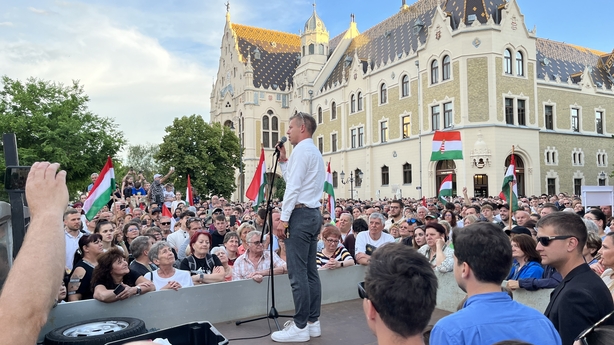
For the past two months, Péter Magyar, a 41-year-old lawyer and former Fidesz ally has been touring the ruling party’s strongholds across the country and speaking to crowds of thousands atop an old pick-up truck.
I attended a rally of Mr Magyar’s centrist Tisza party on 22 May in the city of Kecskemét, a 90-minute train journey south of Budapest.
To the sound of a 1980s Hungarian pop ballad about the 1956 Hungarian revolution, he was received with rapturous applause by a crowd of more than 5,000 people.
Four months ago, few Hungarians had even heard of him, or perhaps had a passing knowledge that he used to be married to the country’s former justice minister.
His centrist Tisza party is now polling at 25% and contesting both the European and local elections.
Mr Magyar did not focus on the war in Ukraine in his speech. Instead, he promised to improve public services such as healthcare and education.
“Hungary is a family business,” he said.
“So let’s dissolve the company and get our money back from the Orbán company,” said Mr Magyar, who claims that Fidesz rule has created a system of cronyism.
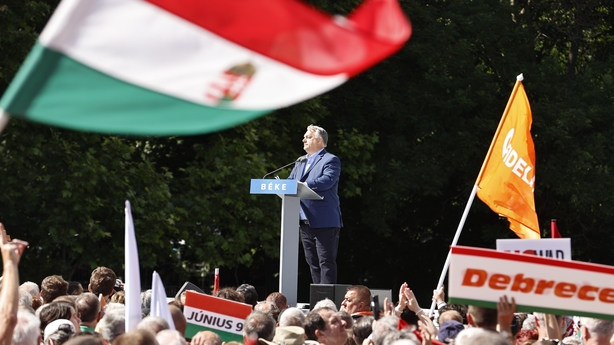
Mr Magyar lambasted both Fidesz and previous left-wing governments for, as he argued, squandering the economic benefits of Hungary’s EU membership, before mentioning Ireland as a country that benefitted from the EU.
Ireland, he said, had been a poor country only decades ago, “now it is a well-off society”.
He closed his speech by asking voters to make a decision between “propaganda or truth”, “the East or West”, “Fidesz or Tisza”. His supporters, of course, chanted “Tisza”, before chanting Mr Magyar’s name in unison.
Most of people I spoke to at the rally in Kecskemét said they had been opposition voters but were looking for an alternative.
When asked for his views on Mr Magyar, during a rare doorstep last month by two independent Hungarian news outlets, Mr Orbán said he considered the subject to be “an internal matter for the left”.
“They are all pro-war and plotting against Hungary in Brussels,” said Mr Orbán when pressed by one of the journalists on whether he thought Mr Magyar’s party could capture support from Fidesz voters.
Mr Magyar has dispelled the label of being “leftist”. Listening to him in Kecskemét, his politics could be defined as centrist.
Abel Bojar, a Hungarian polling expert I spoke to, thinks voter turnout in Hungary on Sunday could be around 60%.
So far, polls do not indicate that Mr Magyar’s party is capturing Fidesz voters in any large number.
But Mr Magyar’s rise is a concern for Fidesz. His image is one of those pictured on the party’s ‘Stop War’ campaign, even though he has not said he is in favour of sending military aid to Ukraine.
Tisza currently lacks a coordinated national structure, but this election could position it as the main opposition in Hungarian politics and provide Fidesz with a serious opponent at the next parliamentary election in 2026.


